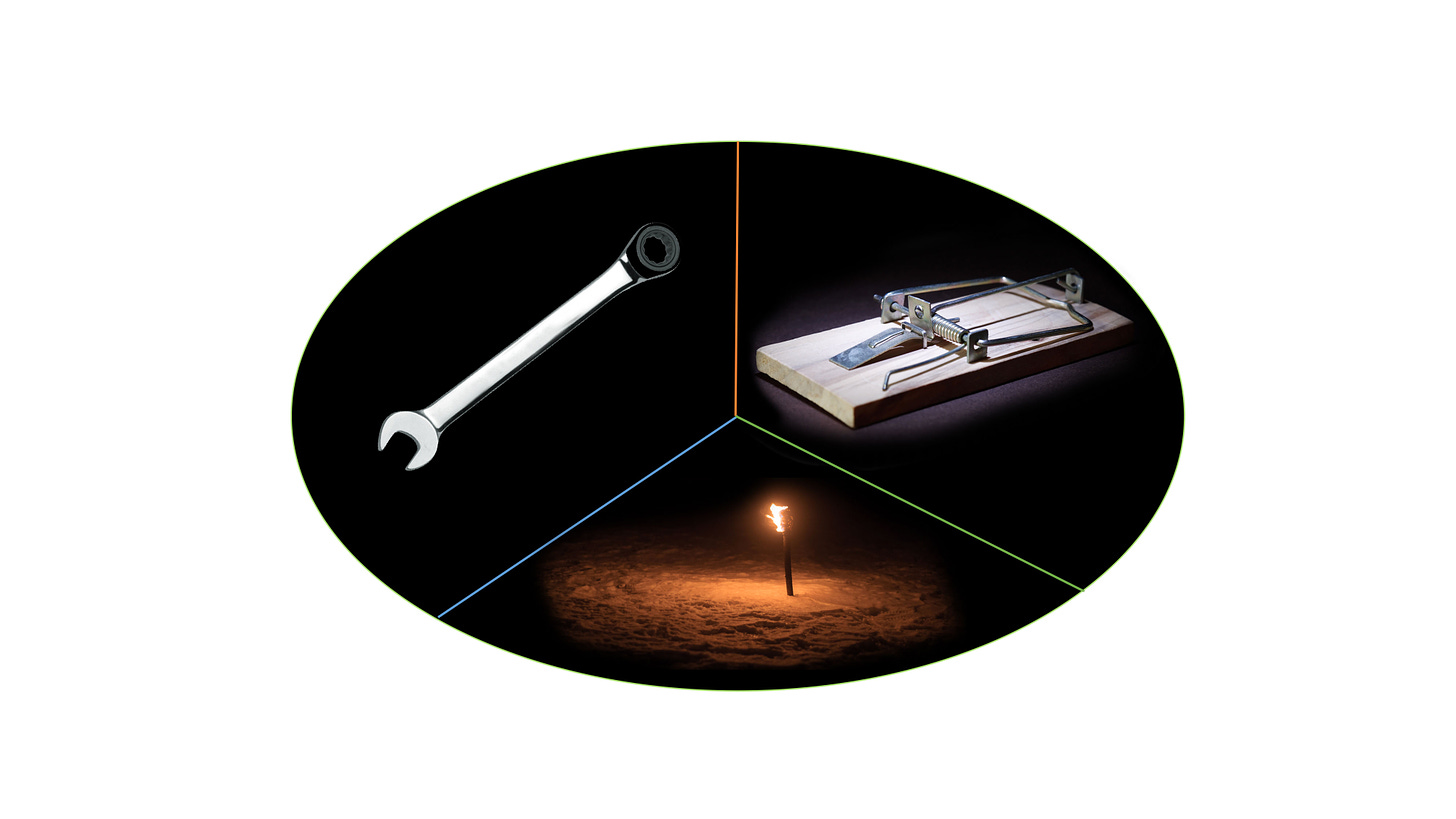True to my theme for this series, I will focus on Tool and Traps useful for the task of navigating the jungle that is the American political landscape. Within our conversation, a tool is a way of looking at an event or situation intended to make it easier to understand and therefore to manage or improve. Meanwhile a trap is distractor that has the effect of creating smoke so that differences appear to be similarities and similarities differences.
Forty years on and my memory endures fresh and bright of an evening class in phenomenology I took as an undergraduate at SUNY New Paltz. Topics focused on the nature of consciousness and perception. The course was taught by Dr. Carlos DaCuñha an animated Argentine law professor with an infectious love for his subject and a wry sense of humor. I remember one regular classroom drill we students either enjoyed or endured was whenever Edmund Husserl – the father of phenomenology – was mentioned by anyone, we had to rise en masse as a mark of respect.
Another example of DaCuñha’s distinctive pedagogic style occurred on Halloween night that year when he entered his class looking quite annoyed. He sat frowning at us from behind his open briefcase on the table in front of him. After posing a question to which one student made a lengthy response, DaCuñha used this diversion to disappear behind his open case. Moments later he closed the case with a bang and revealed himself in a childs' plastic Casper ghost mask and a body-length white cloak. He taught the rest of the class from behind Casper! Restrained laughter became hysterics when our professor rose, swept in spectral dress to the board, made a note, turned to us, and with stern voice and pointed finger commanded we, “write this down”. Casper handed out candy at the door as we filed out at the end.
Our final exam was an application of phenomenological principles to the way court cases are decided. Indeed, this exam was memorable; deeply profound in ways I could not then have appreciated. Focusing on the process by which trial jurors formulate their verdict, the exam consisted of a single question: ‘Who is more certain, the perceiver or the hallucinator’. [Substack readers, take five minutes to talk amongst yourselves.]
“The perceiver” I reasoned triumphantly! “This person possesses the ability to listen to and process the facts of a case”. However, my frighteningly intelligent girlfriend – who was also taking the course – begged to differ. And in fact, she was correct. I was not. While perceivers are able to hear facts, their task as jurors is to use these facts and impressions to assemble a picture of what happened; then faithfully to synchronize this perception with the events. In addition, perceivers must rely on memory, which is fallible, subject to doubt and biases.
Hallucinators meanwhile have none of these problems because their opinions are not contingent on what actually happened. They invent their version of the story in one single seamless piece that is wholly compatible with their internal biases. Indeed, what they see is their own creation. The exam question was who is more certain, not who is more correct. Hallucinators don’t have to be correct to be certain. Their certainty is founded not on truth, but on feeling.
In today’s political climate we recognize that hallucinators can be quite dangerous, even to themselves. They can pilot planes into World Trade Centers or mobilize to fight a civil war over their hallucination that a lost election was won. For them, evidence is a red herring, not a binding element of truth. Similarly, they can literally sacrifice their lives in Covid denial and, in some states, insist that others do as well. Hallucinators cannot be reasoned with because their awareness of events is registered in feelings that balloon exponentially when buttressed by two factors: loyalty to the ringmaster who triggered the hallucination in the first place, and the companionship of other hallucinators whose allegiance is needed to help keep it all alive.
Essentially, hallucinators believe the emperor is clothed by virtue of other people believing that he is.
The fact that 900,000 Americans have already died from Covid, and that virtually all Covid deaths in the past year come from the non-vaccinated is without force to alter their behavior..... until they themselves lie intubated in an ICU beyond the biological authority of a vaccine to save them. Then the hallucination breaks and the freedom they claimed to have won with their Covid-denial disperses into the ether. Only then are they left with the solitude which triggered their hallucination in the first place.





Best take-away from this tremendous article…”Hallucinators don’t have to be correct to be certain. Their certainty is founded not on truth, but on feeling.” Our problem, in a nutshell & my new Twitter profile quote, with your permission😉